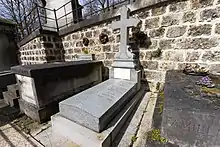Andre Barcat
Sous-lieutenant André Jean Louis Barcat (8 November 1896 – 16 July 1918) was a French World War I flying ace credited with five aerial victories.[1]
André Jean Louis Barcat | |
|---|---|
| Born | 8 November 1896 Paris, France |
| Died | 16 July 1918 (aged 21) Malmy, Marne, France |
| Allegiance | France |
| Service/ | French Army |
| Years of service | 1915–1918 |
| Rank | Sous-lieutenant |
| Unit | 30e Régiment d'Artillerie Escadrille F 206 83e Régiment d'Artillerie 81e Régiment d'Artillerie Escadrille SPA 155 Escadrille SPA 153 |
| Battles/wars | World War I |
| Awards | Légion d'honneur Croix de guerre |
World War I service
Barcat entered the army and was posted to the 30e Régiment d'Artillerie on 12 April 1915.[1][2] On 12 June he was sent to the military flying school at Fontainebleau, and was appointed an aspirant on 15 September 1915.[2] On 13 December 1915 he was posted to Escadrille F 206,[2] to fly as an observer for six months before returning to Fontainebleau on 1 July 1916, where he was promoted to the provisional rank of sous-lieutenant on 27 September.[2] He then served in the 83e Régiment d'Artillerie, transferring to the 81e Régiment d'Artillerie on 23 December 1916.[2]
On 15 September 1917 Barcat transferred Aéronautique Militaire and was sent to the military flying school at Chartres to train as a pilot,[1][2] receiving his military pilot's brevet at Avord on 28 November.[1][2] He was posted to Escadrille SPA 155 on 11 February 1918, but soon after, on 22 February, was transferred to Escadrille SPA 153.[1][2] On 15 March Barcat flew one of six aircraft from his unit escorting a formation of nineteen Breguet 14 bombers on an attack on the railway station at Neuflize. During the mission Barcat attacked an enemy two-seater, but without result.[3] His first confirmed aerial victory came on 21 March 1918 when Barcat (flying a SPAD S.XIII) and Sous-lieutenant Gilbert de Guingand of Escadrille SPA.48 shot down in flames an enemy aircraft near Mont Cornille, east of Reims.[1][3] On 2 May 1918, while on patrol, Barcat (now flying a SPAD S.VII) was credited with shooting down one of three Pfalz D.III fighters engaged by himself, Sous-lieutenant Louvat and Sergeant Morel, with Lieutenant Auguste Lahoulle from Escadrille SPA 154, over Montdidier. One of the other D.III's was sufficiently damaged to have to make a forced landing in the French lines nearby.[1][3] On 15 May, during a particularly active day, Barcat and Adjudant Bernard Artigau shot down a Rumpler two-seater reconnaissance aircraft, which crashed north of Thory.[1][3] On 19 May Barcat was taking Maréchal-des-logis Arrault, a newly arrived pilot, out on a training patrol, when they encountered and attacked an enemy scout, forcing it to land near Ailly-sur-Noye where the German pilot was taken prisoner.[1][3] Barcat's fifth victory came on 2 June, when he and Maréchal-des-logis Georges Halberger set fire to an observation balloon east of Thory. With this victory Barcat became the first 'ace' in his unit.[1][3] On 13 June 1918 Barcat and Halberger claimed two Fokker D.VIIs shot down near Saint-Pierre-Aigle. Finally, on 16 July, during a day of aggressive German attacks, Barcat was shot down in flames over Malmy and was killed.[3]
Barcat was posthumously made a Chevalier of the Légion d'honneur on 30 July 1919,[1] his citation reading:
- "An officer of admirable strength, a model of discipline and tenacity in combat. Killed on 16 July 1918, having reported his fifth victory. He has been cited."[1]
He also received the Croix de guerre with three palms and the etoile de Vermeil ("silver-gilt star").[2]
References
- "André Jean Louis Barcat". The Aerodrome. Retrieved 28 July 2017.
- "Barcat, André Jean Louis". Ciel de gloire.com (in French). Retrieved 28 July 2017.
- Albin, Denis. "L'escadrille 153". L'histoire de l'aviation militaire française (in French). Retrieved 28 July 2017.
Further reading
- Franks, Norman & Bailey, Frank W. (1992). Over the Front: A Complete Record of the Fighter Aces and Units of the United States and French Air Services, 1914–1918. London, UK: Grub Street. ISBN 978-0-948817-54-0.
